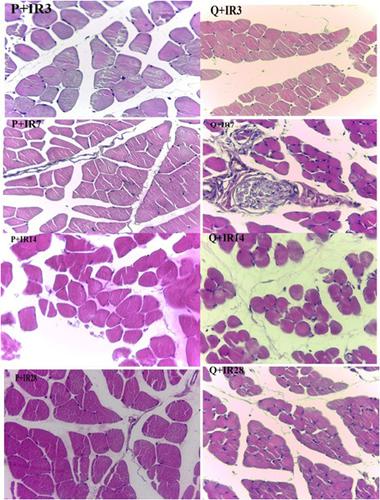当前位置:
X-MOL 学术
›
J. Cell. Physiol.
›
论文详情
Our official English website, www.x-mol.net, welcomes your feedback! (Note: you will need to create a separate account there.)
Quercetin postconditioning attenuates gastrocnemius muscle ischemia/reperfusion injury in rats.
Journal of Cellular Physiology ( IF 5.6 ) Pub Date : 2020-05-21 , DOI: 10.1002/jcp.29801 Reza Mohammadrezaei Khorramabadi 1 , Khatereh Anbari 2 , Mohammad Reza Salahshoor 3 , Masoud Alasvand 4 , Vahideh Assadollahi 4 , Mohammadreza Gholami 3
Journal of Cellular Physiology ( IF 5.6 ) Pub Date : 2020-05-21 , DOI: 10.1002/jcp.29801 Reza Mohammadrezaei Khorramabadi 1 , Khatereh Anbari 2 , Mohammad Reza Salahshoor 3 , Masoud Alasvand 4 , Vahideh Assadollahi 4 , Mohammadreza Gholami 3
Affiliation

|
Quercetin, an antioxidant derived from plants, can play a beneficial role in the protection of various tissues against ischemia‐reperfusion injuries (IRI). The purpose of the present research was to investigate the protective effects of quercetin on gastrocnemius muscle ischemia‐reperfusion. A total of 80 adult male Wistar rats (weights: 250–300 g) were divided into ten groups (n = 8 per group). We used silk 6.0 surgical thread to create a knit to occlude the femoral artery and vein for 3 hr. The treated groups, which comprised half of each experimental group, received intraperitoneal injections of 150 mg/kg quercetin after the ischemia. Blood flow was subsequently reestablished in the reperfusion phase. The rats were kept in reperfusion for 3, 7, 14, or 28 days after which they were killed with high doses of anesthetic drugs, and the gastrocnemius muscles were removed and fixed. Tissue processing, hematoxylin and eosin and toluidine blue staining, and immunohistochemistry were used to assess tumor necrosis factor‐α (TNF‐α) and nuclear factor κB (NF‐κB) levels. A comparison between treated and untreated ischemic sites showed that on the third day of reperfusion, the severity of edema and NF‐κB level decreased significantly; on the 7th day of reperfusion, the severity of edema and the levels of TNF‐α and NF‐κB decreased significantly; and on the 14th day of reperfusion, all of the parameters showed significant decreases. On the 28th day of reperfusion, there were significantly decreased levels of TNF‐α and NF‐κB, and decreased mast cell infiltration when compared with the untreated groups. According to the results, administration of quercetin after ischemia could significantly prevent gastrocnemius muscle IRI.
中文翻译:

槲皮素后处理可减轻大鼠腓肠肌的缺血/再灌注损伤。
槲皮素是一种源自植物的抗氧化剂,可以在保护各种组织免受缺血再灌注损伤(IRI)方面发挥有益作用。本研究的目的是研究槲皮素对腓肠肌缺血再灌注的保护作用。将80只成年雄性Wistar大鼠(体重:250–300 g)分为十组(n =每组8个)。我们使用丝绸6.0外科手术线来制作编织物以闭合股动脉和静脉3个小时。组成各实验组一半的治疗组在缺血后接受腹膜内注射150 mg / kg槲皮素。随后在再灌注阶段重建血流。将大鼠再灌注3、7、14或28天,然后用大剂量麻醉药将其杀死,然后摘除并固定腓肠肌。使用组织处理,苏木精和曙红和甲苯胺蓝染色以及免疫组化方法评估肿瘤坏死因子-α(TNF-α)和核因子κB(NF-κB)的水平。比较已治疗和未治疗的缺血部位,结果显示在再灌注的第三天,水肿严重程度和NF-κB水平明显降低; 在再灌注的第7天,水肿的严重程度以及TNF-α和NF-κB的水平明显降低;在再灌注的第14天,所有参数均显着下降。与未治疗组相比,在再灌注的第28天,TNF-α和NF-κB的水平显着降低,肥大细胞浸润减少。根据结果,缺血后给予槲皮素可显着预防腓肠肌IRI。与未治疗组相比,肥大细胞浸润减少。根据结果,缺血后给予槲皮素可显着预防腓肠肌IRI。与未治疗组相比,肥大细胞浸润减少。根据结果,缺血后给予槲皮素可显着预防腓肠肌IRI。
更新日期:2020-05-21
中文翻译:

槲皮素后处理可减轻大鼠腓肠肌的缺血/再灌注损伤。
槲皮素是一种源自植物的抗氧化剂,可以在保护各种组织免受缺血再灌注损伤(IRI)方面发挥有益作用。本研究的目的是研究槲皮素对腓肠肌缺血再灌注的保护作用。将80只成年雄性Wistar大鼠(体重:250–300 g)分为十组(n =每组8个)。我们使用丝绸6.0外科手术线来制作编织物以闭合股动脉和静脉3个小时。组成各实验组一半的治疗组在缺血后接受腹膜内注射150 mg / kg槲皮素。随后在再灌注阶段重建血流。将大鼠再灌注3、7、14或28天,然后用大剂量麻醉药将其杀死,然后摘除并固定腓肠肌。使用组织处理,苏木精和曙红和甲苯胺蓝染色以及免疫组化方法评估肿瘤坏死因子-α(TNF-α)和核因子κB(NF-κB)的水平。比较已治疗和未治疗的缺血部位,结果显示在再灌注的第三天,水肿严重程度和NF-κB水平明显降低; 在再灌注的第7天,水肿的严重程度以及TNF-α和NF-κB的水平明显降低;在再灌注的第14天,所有参数均显着下降。与未治疗组相比,在再灌注的第28天,TNF-α和NF-κB的水平显着降低,肥大细胞浸润减少。根据结果,缺血后给予槲皮素可显着预防腓肠肌IRI。与未治疗组相比,肥大细胞浸润减少。根据结果,缺血后给予槲皮素可显着预防腓肠肌IRI。与未治疗组相比,肥大细胞浸润减少。根据结果,缺血后给予槲皮素可显着预防腓肠肌IRI。



























 京公网安备 11010802027423号
京公网安备 11010802027423号